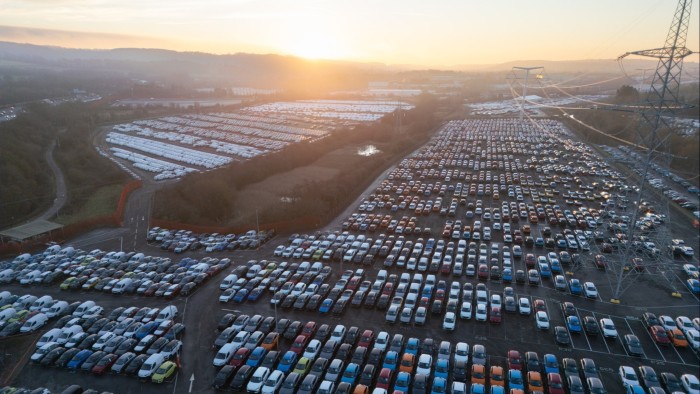Stay informed with free updates
Simply sign up to the Electric vehicles myFT Digest — delivered directly to your inbox.
With a strong rise in electric vehicle sales in Europe so far this year, consumers appear finally to be ready to make their switch away from the internal combustion engine.
But car executives say a big challenge for the industry is to continue the positive momentum with an attractive line-up of affordable EVs at a time when there is high regulatory uncertainty and lingering consumer doubts over the path to electric transition.
“We are cautiously optimistic because we see the more people get into the EVs, and experience it, the more they like it,” Michael Lohscheller, chief executive of EV maker Polestar, told last week’s FT Future of the Car summit. “We have seen very few people driving an EV go back to an internal combustion engine.”
Registrations of new electric cars in wider Europe and the UK increased 28 per cent to 573,500 vehicles during the first three months of the year, driven by a sharp recovery in Germany, according to European car industry body ACEA.
The sales have been supported by an increase in affordable models priced below €25,000, such as the Renault 5 and Citroën ë-C3, and other relatively lower cost EVs are expected next year.
New offerings from Chinese brands such as BYD, Omoda and Jaecoo have also helped to spur demand, particularly in the UK market, with the three manufacturers capturing a combined 3 per cent share in 2024 in a short period since launching EVs there, according to online marketplace Auto Trader.
“Chinese brands are increasingly pivotal players in the UK’s electric transition and their ability to offer affordable, high-quality [EVs] is winning over the younger drivers specifically, who will play a vital role in mass adoption of electric vehicles,” says Ian Plummer, commercial director at Auto Trader.
The surge in electric car sales in early 2025 had been widely anticipated since carmakers had prepared an aggressive rollout of EVs this year to meet tougher emissions regulations in the EU, with some having delayed their launches to increase their chances of compliance.
But with both the EU and the UK easing rules over vehicle emissions to support the car industry, some analysts warn that lowering the pressure now on the phaseout of petrol vehicles could once again slow the electric transition.
More stories in this report
“It’s ironic that the EU is delaying emissions targets for the car industry just as EV sales surge,” says Lucien Mathieu, cars director at Transport and Environment (T&E), an environmental NGO. “This delay will allow the industry to take the foot off the gas for the EV rollout while also slowing down investments.”
In the UK, the government has decided to water down its sales targets for EVs, with lower punitive fines and greater flexibility in meeting the requirements. The current scheme requires a certain percentage of each carmaker’s annual sales to be zero-emission vehicles, with the percentage rising annually from 28 per cent this year to 80 per cent in 2030. As of April, the EV market share was at 20.4 per cent, according to the Society of Motor Manufacturers and Traders.
T&E has warned that if all this flexibility were fully utilised by carmakers, it could create “a severe compliance cliff edge by the end of the decade — setting manufacturers up for failure by risking irresponsible use of flexibilities and disrupting what should be a stable transition”.

In recent earnings briefings, car executives have denied that the pace of their EV launches will slow down with the relaxation of EU’s emissions regulations since they have already made heavy investments and longer-term decarbonisation targets are here to stay.
Still, Arno Antlitz, Volkswagen’s chief financial officer, has said sales of electric cars will continue to weigh on earnings for now since it is more costly to make EVs than their petrol counterparts.
“To be honest, on the pricing side, there’s still a lot of support necessary for the battery electric vehicles,” Antlitz recently told analysts, citing the discounts the group is offering to convince consumers to buy their EVs.
VW expects profit margins on EVs to improve from next year with the launch of its ID2 — its first EV with a price tag under €25,000 — but for the first quarter, its operating profit declined 37 per cent from a year earlier as EV sales in Europe more than doubled.
Watch the FT Future of the Car summit
May’s London conference featured senior industry figures and FT journalists. Pay to view video of all sessions at car.live.ft.com
Ford, which recently launched an all-electric Puma Gen-E in Europe, reported first-quarter losses of $850mn in its electric vehicle segment — although that was an improvement on a $1.3bn loss recorded during the same period last year.
With the launch of the new electric CLA model this year, Mercedes-Benz aims to narrow the price gap between electric and petrol vehicles. But at its annual shareholders meeting earlier this month, chief executive Ola Källenius said the company will continue to cater to consumers who are not ready to make the switch.
“In the coming years, we will offer both state-of-the-art electric vehicles and state-of-the-art electrified combustion engines,” Källenius said. “Our plans are set up flexibly, allowing us to respond quickly to market developments.”




